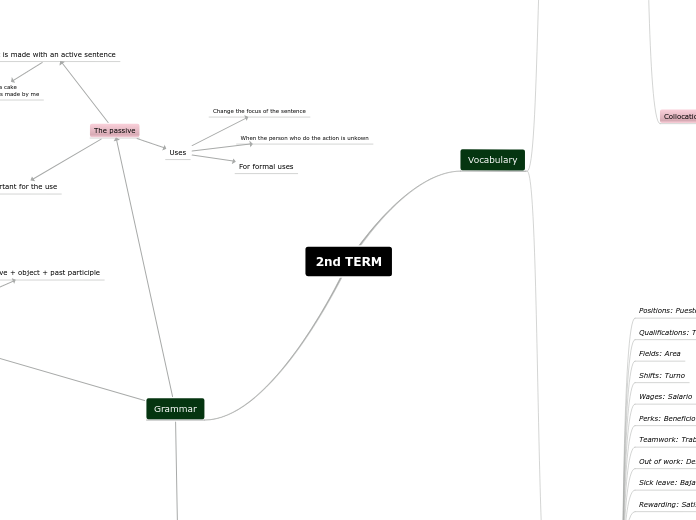2nd TERM
Vocabulary
3.That's entertainment
Stunts: Escenas peligrosas
Awesome: Impresionante
Outrageous: Indignante
Released: Lanzar, hacerlo publico
Leading role: Papel principal (jefe)
Box-office hit: Exito de taquilla
Plot: Argumento
Sets: Coleccion
Sold out: Agotado
Script: Guion
Appeals to: Gustar
Dubbed: Doblar
Cast: Reparto
Behind the scenes: Detras de camaras
Filmgoers: Aficionados al cine
Predictable: Predecible
Fast-paced: Acelerado
Worth seeing: Vale la pena ver
Genders: Genero
Move with the times: Moverse con el tiempo
Reflect: Reflejar
Look on: Observar, considerar
Figures: Personajes
Collocations:
Make +
progress
a suggestion
sense
a choice
an appointment
Take +
part
olace
a risk
one's time
responsability
Raise +
issues
money
one's voice
a question
children
4.World of work
Positions: Puesto de trabajo
Qualifications: Titulos
Fields: Area
Shifts: Turno
Wages: Salario
Perks: Beneficio
Teamwork: Trabajo en equipo
Out of work: Desempleado, despedido
Sick leave: Baja por enfermedad
Rewarding: Satisfactorio
People skills: Habilidades sociales
Rise: Aumento, crecer, subir
Reliable: Fiable
Room for advancement: Espacio para adelantar
Deadlines: Fecha de entrega
Work his way up: Trabajar a su manera
Steady job: Trabajo asegurado
Overtime: Horas extras
Part-time: Media jornada
Seasonal: De temporada
Expresions
Burn out: Consumirse, agotarse
Rat race: Carrera de locos
Pulling your weight: Trabajar lo mismo que el resto
Got fired: Despedido
Hold down a job: Mantener un trabajo
Gets paid peanuts: Pagarle muy poco a alguien
Grammar
The passive
It is made with an active sentence
Acctive: I make a cake
Passive: A cake is made by me
Uses
Change the focus of the sentence
When the person who do the action is unkown
For formal uses
Important for the use
The causatve
When we want to talk about something that someone else did for us
I cleaned my house
If someone did it for you, you use the causative
I had my house cleaned
A cleaner cleaned my house
Structure
Subj. + past participle + object
Subj. + have + object + past participle
Relative clauses
To gve more information about something
2 types:
Defining
We can use THAT instead of WHO/WHICH
Types
Relative pronoun is the subject
I'm looking for a secretary who / that can use a computer well.
Relative pronoun is the object
The university (which / that) she likes is famous.
Non-defining
We can't use THAT
The use of comas
Examples
My boss, who is very nice, lives in Manchester.
Yesterday I called our friend Julie, who lives in New York.
